外研版九年级下册Module 4 Rules and suggestions Unit 2课件(共23张PPT)
文档属性
| 名称 | 外研版九年级下册Module 4 Rules and suggestions Unit 2课件(共23张PPT) |
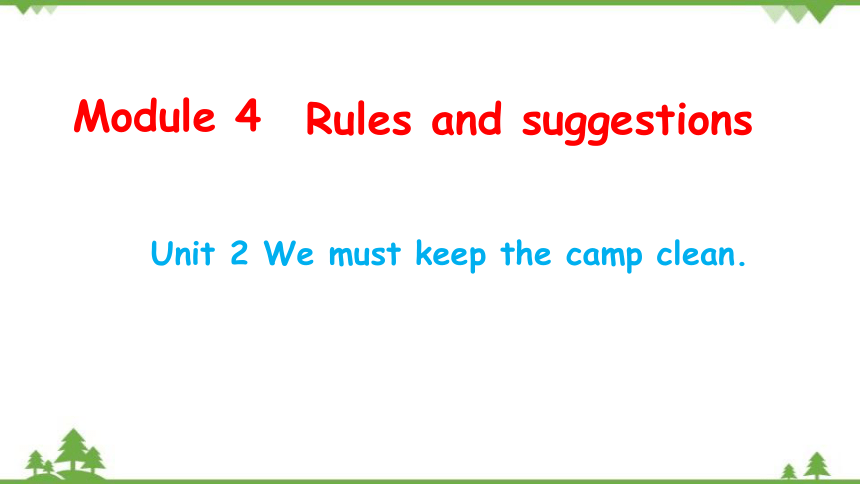
|
|
| 格式 | pptx | ||
| 文件大小 | 670.3KB | ||
| 资源类型 | 教案 | ||
| 版本资源 | 外研版 | ||
| 科目 | 英语 | ||
| 更新时间 | 2023-02-10 19:12:20 | ||
图片预览

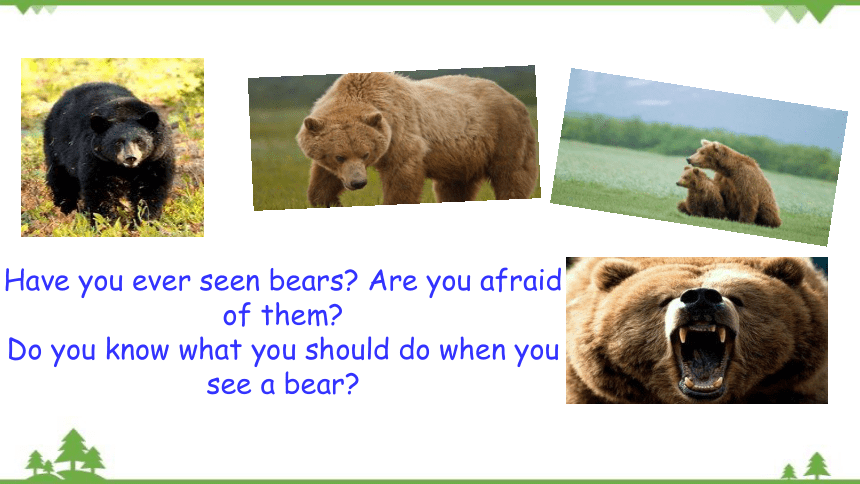
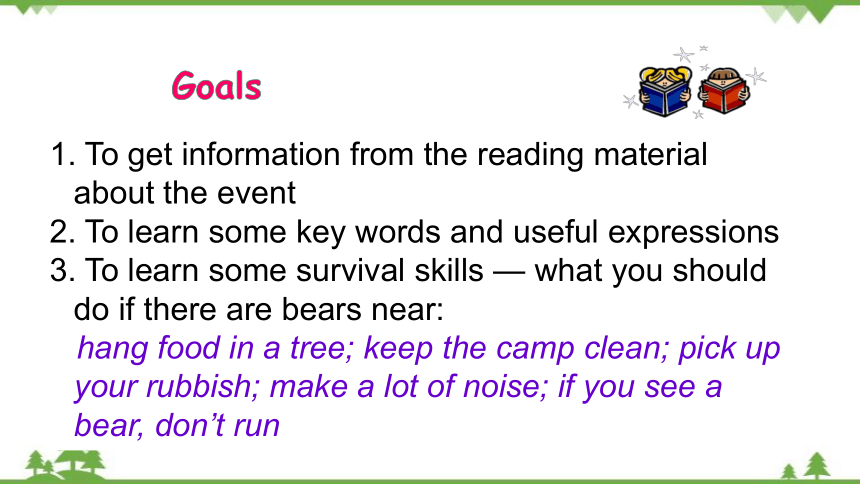
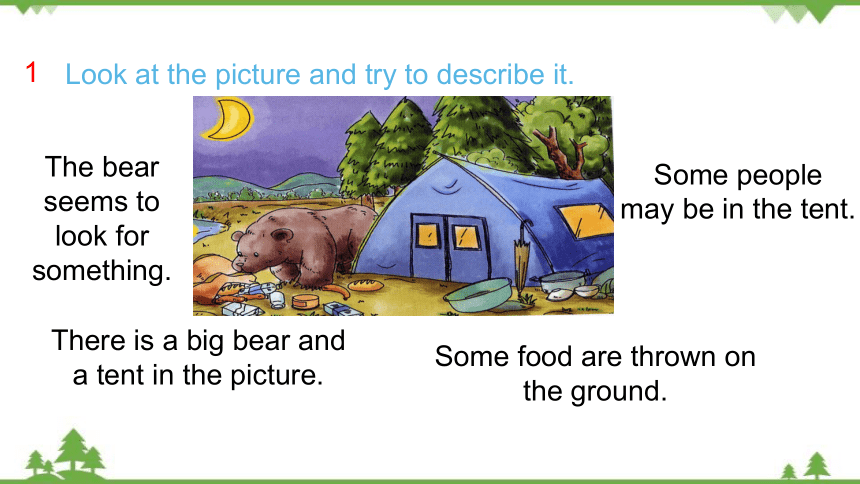
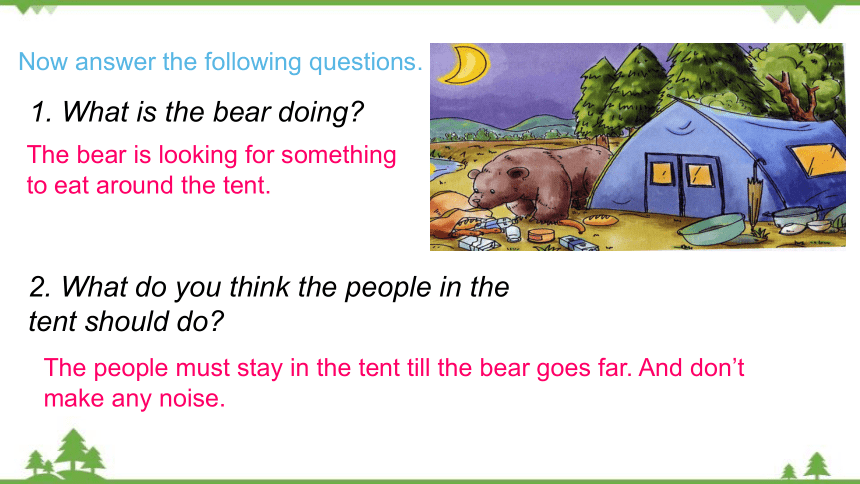
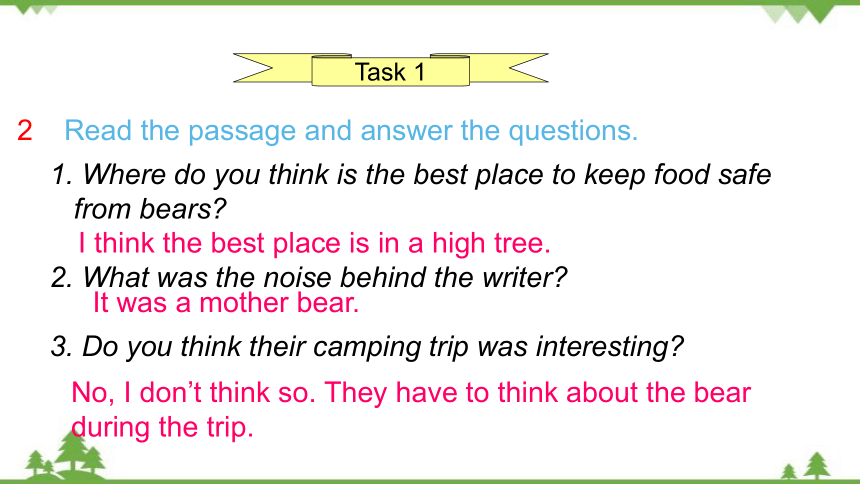
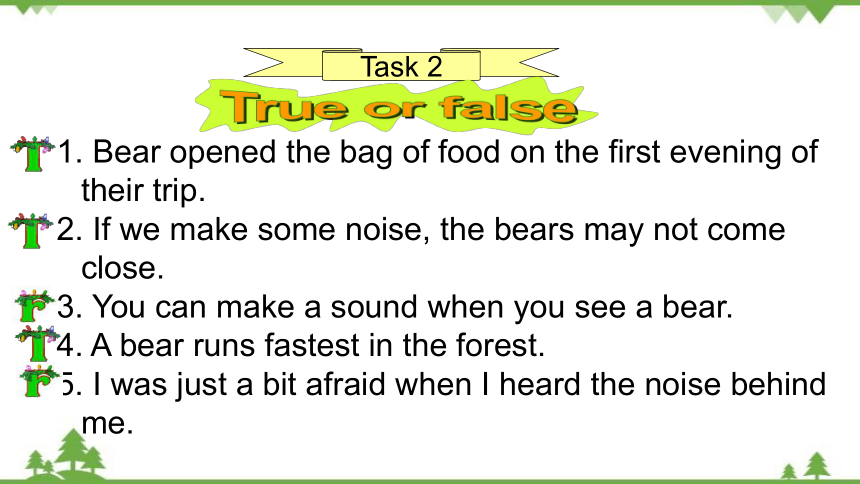
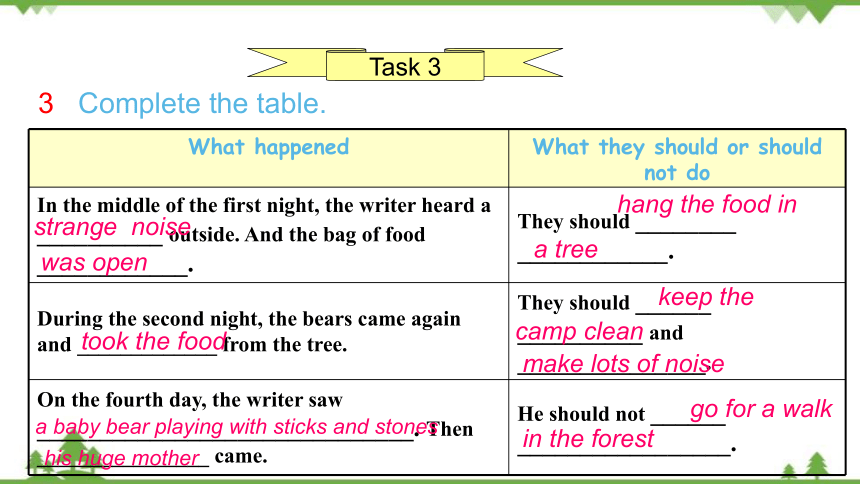
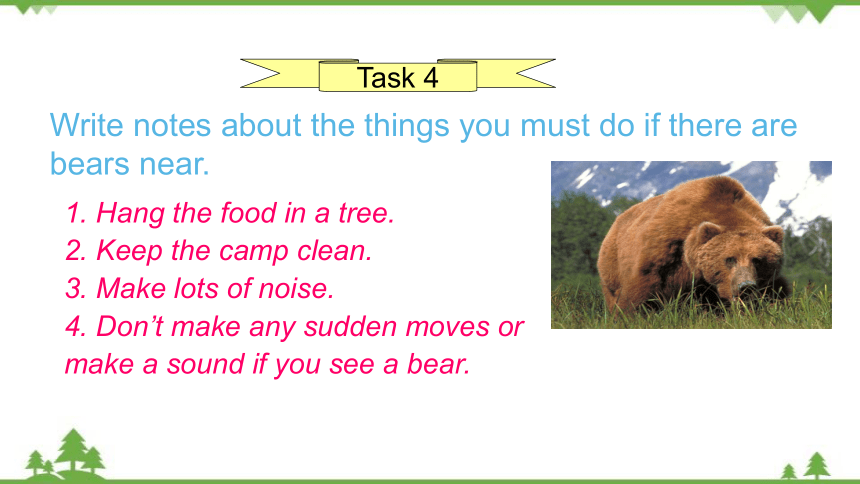
文档简介
(共23张PPT)
Unit 2 We must keep the camp clean.
Rules and suggestions
Module 4
Have you ever seen bears Are you afraid of them
Do you know what you should do when you see a bear
1. To get information from the reading material about the event
2. To learn some key words and useful expressions
3. To learn some survival skills — what you should do if there are bears near:
hang food in a tree; keep the camp clean; pick up your rubbish; make a lot of noise; if you see a bear, don’t run
Goals
Look at the picture and try to describe it.
1
There is a big bear and a tent in the picture.
The bear seems to look for something.
Some people may be in the tent.
Some food are thrown on the ground.
Now answer the following questions.
1. What is the bear doing
2. What do you think the people in the tent should do
The bear is looking for something to eat around the tent.
The people must stay in the tent till the bear goes far. And don’t make any noise.
Read the passage and answer the questions.
2
Task 1
1. Where do you think is the best place to keep food safe from bears
2. What was the noise behind the writer
3. Do you think their camping trip was interesting
I think the best place is in a high tree.
It was a mother bear.
No, I don’t think so. They have to think about the bear during the trip.
Task 2
1. Bear opened the bag of food on the first evening of their trip.
2. If we make some noise, the bears may not come close.
3. You can make a sound when you see a bear.
4. A bear runs fastest in the forest.
5. I was just a bit afraid when I heard the noise behind me.
Task 3
Complete the table.
3
What happened What they should or should not do
In the middle of the first night, the writer heard a __________ outside. And the bag of food ____________. They should ________
____________.
During the second night, the bears came again and _____________ from the tree. They should ______
__________ and _______________.
On the fourth day, the writer saw ______________________________. Then ________________ came. He should not ______
_________________.
strange noise
was open
hang the food in
a tree
took the food
keep the
camp clean
make lots of noise
a baby bear playing with sticks and stones
his huge mother
go for a walk in the forest
Write notes about the things you must do if there are bears near.
1. Hang the food in a tree.
2. Keep the camp clean.
3. Make lots of noise.
4. Don’t make any sudden moves or make a sound if you see a bear.
Task 4
On the third day of our camping trip, Ben told us that if we saw a bear, we should not make any (1) _______ moves. We did not have a (2) _______ to keep ourselves safe. The next day, I saw a baby bear playing with some (3) _______ and stones. His mother arrived soon, and I was so afraid that my (4) ________ went cold. I did not move until the bears walked away. Then I ran back to my friends as fast as I could.
blood gun sticks sudden
sudden
gun
sticks
blood
Complete the passage with the words in the box.
Task 5
Language points
1. We soon fell asleep. 我们很快就睡着了。
fall asleep意为“入睡;睡着”,是系表结构的短语。其中fall用作连系动词,意为“变成,进入(某种状态)”。
He was so tired that he fell asleep in the car.
他太累了,在汽车里睡着了。
fall asleep意为“入睡”,表示动作,侧重于“自然而然地入睡”,有时指无意之中或在不适当的场合睡着。 My father fell asleep on the sofa.我爸爸在沙发上睡着了。
辨析fall asleep,be asleep,go to sleep与go to bed
be asleep意为“睡着的”,表示一种状态,可以和表示一段时间的状语连用。 The child has been asleep for two hours.这个孩子已经睡了两个小时了。
go to sleep意为“睡着;入睡”,表示从清醒到渐渐睡着这一过程,强调进入睡眠状态。 He always goes to sleep at eleven every night.每天晚上他总是十一点钟入睡。
go to bed表示“上床睡觉”,强调上床睡觉这个动作,无“睡着”之意,它的对应词组是get up“起床”。 We went to bed at nine and fell asleep at ten.
我们九点钟上床睡觉,十点钟入睡。
2. We should hang the food in a tree tonight. 今天晚上我们应该把食物挂在树上。
hang动词,意为“悬挂;吊”,其过去式、过去分词均为hung。
He often hangs his schoolbag on the wall.他经常把书包挂在墙上。
Please hang the washing on the line. 请把洗好的衣服挂在绳上。
【拓展】
hang作动词还可表示“绞死;施以绞刑”,其过去式、过去分词均为hanged。
He was hanged. 他被绞死了。
(无锡中考)
春节前红灯笼经常被沿街悬挂。
Red lanterns are often ______ (hang) along the streets before Spring Festival.
点拨:分析句子结构并结合句意可判断出,本句为一般现在时的被动语态,所以应该用hang的过去分词。hang表示“悬挂”之意时,过去分词为不规则变化,故填hung。
3. We put up the tent and fell asleep. 我们搭起帐篷入睡了。
put up意为“搭起;盖起”,是“动词+副词”结构的短语,代词作宾语时,必须放在put与up之间。
They put up a new house over there.
他们在那边盖了一栋新房子。
I bring a tent. Can you help me to put it up
我带来一个帐篷,你能帮我搭起它吗?
【拓展】
put up还可以意为“举起;张贴”
Jim put up his hand to ask a question. 吉姆举手问了一个问题。
They put up a map on the wall. 他们在墙上贴了一幅地图。
4. He looked so soft and friendly, and I remember thinking, “If I reach out, I can just touch him.” 它看起来那么柔软、那么友好,我现在还记得当时在想:“我要是伸出手的话,就能摸到它。”
reach out意为“伸出”,其后常与介词to连用,表示“接触;向(某人)提供援助”。
She reached out her hand and took the money away.她伸出手将钱拿走。
We should reach out to the poor children.
我们应该向贫穷的孩子们伸出援助之手。
【拓展】
reach out for sth.意为“伸手拿某物”。
The little boy is trying to reach out for a book.
这个小男孩正在努力伸手够一本书。
5. I stood very still. 我一动不动地站着。
still形容词,意为“静止的;不动的”,指平和、安静的状态。
Keep still while I tie your shoe. 别动,我给你系鞋带。
All the still water mirrors the cloudy sky. 大片的静水映出多云的天空。
【拓展】
still作副词,意为“仍然;还是”,此时常用于although/though引导的让步状语从句中。
I still live in the city now. 我现在仍然住在这个城市。
Although Jack was a little tired, he still went on with his work.
尽管杰克有点累,但他仍然继续工作。
still作副词,还可以用来修饰比较级。
She is still more beautiful now. 她现在更加漂亮了。
Writing
Think of an area of countryside nearby. Answer the questions and make notes. You can use reference books or the Internet to help you.
·Where is it
·Why do people go there
·Are there any dangers from animals
·How can we protect ourselves
·What should we do to look after the place
Write sentences with the notes you have made
in Activity 5.
·Say where it is.
Lushan National Park is in Jiangxi Province.
·Say why people go there.
People go there to see the mountains and streams.
·Say if there are any dangers from animals.
The fish and birds there are not dangerous,but there are
some snakes.
·Say how we can protect ourselves.
We mustn't walk in the grass.
·Say what we should do to look after the place.
We should allow only 1,000 people to visit it each day.
Write a passage called Look after the countryside and yourself. Use the sentences you have written in Activity 6 to help you.
总结回顾
本节课主要学习了知识点 fall asleep,hang,put up,reach out , still的用法, 通过学习课文“Watch out! Bears about!”学会了谈论在一定情况下应该或不应该做什么。
1. Preview the new words and expressions in Unit 2.
2. Search for some information about ecotourism.
Homework
Unit 2 We must keep the camp clean.
Rules and suggestions
Module 4
Have you ever seen bears Are you afraid of them
Do you know what you should do when you see a bear
1. To get information from the reading material about the event
2. To learn some key words and useful expressions
3. To learn some survival skills — what you should do if there are bears near:
hang food in a tree; keep the camp clean; pick up your rubbish; make a lot of noise; if you see a bear, don’t run
Goals
Look at the picture and try to describe it.
1
There is a big bear and a tent in the picture.
The bear seems to look for something.
Some people may be in the tent.
Some food are thrown on the ground.
Now answer the following questions.
1. What is the bear doing
2. What do you think the people in the tent should do
The bear is looking for something to eat around the tent.
The people must stay in the tent till the bear goes far. And don’t make any noise.
Read the passage and answer the questions.
2
Task 1
1. Where do you think is the best place to keep food safe from bears
2. What was the noise behind the writer
3. Do you think their camping trip was interesting
I think the best place is in a high tree.
It was a mother bear.
No, I don’t think so. They have to think about the bear during the trip.
Task 2
1. Bear opened the bag of food on the first evening of their trip.
2. If we make some noise, the bears may not come close.
3. You can make a sound when you see a bear.
4. A bear runs fastest in the forest.
5. I was just a bit afraid when I heard the noise behind me.
Task 3
Complete the table.
3
What happened What they should or should not do
In the middle of the first night, the writer heard a __________ outside. And the bag of food ____________. They should ________
____________.
During the second night, the bears came again and _____________ from the tree. They should ______
__________ and _______________.
On the fourth day, the writer saw ______________________________. Then ________________ came. He should not ______
_________________.
strange noise
was open
hang the food in
a tree
took the food
keep the
camp clean
make lots of noise
a baby bear playing with sticks and stones
his huge mother
go for a walk in the forest
Write notes about the things you must do if there are bears near.
1. Hang the food in a tree.
2. Keep the camp clean.
3. Make lots of noise.
4. Don’t make any sudden moves or make a sound if you see a bear.
Task 4
On the third day of our camping trip, Ben told us that if we saw a bear, we should not make any (1) _______ moves. We did not have a (2) _______ to keep ourselves safe. The next day, I saw a baby bear playing with some (3) _______ and stones. His mother arrived soon, and I was so afraid that my (4) ________ went cold. I did not move until the bears walked away. Then I ran back to my friends as fast as I could.
blood gun sticks sudden
sudden
gun
sticks
blood
Complete the passage with the words in the box.
Task 5
Language points
1. We soon fell asleep. 我们很快就睡着了。
fall asleep意为“入睡;睡着”,是系表结构的短语。其中fall用作连系动词,意为“变成,进入(某种状态)”。
He was so tired that he fell asleep in the car.
他太累了,在汽车里睡着了。
fall asleep意为“入睡”,表示动作,侧重于“自然而然地入睡”,有时指无意之中或在不适当的场合睡着。 My father fell asleep on the sofa.我爸爸在沙发上睡着了。
辨析fall asleep,be asleep,go to sleep与go to bed
be asleep意为“睡着的”,表示一种状态,可以和表示一段时间的状语连用。 The child has been asleep for two hours.这个孩子已经睡了两个小时了。
go to sleep意为“睡着;入睡”,表示从清醒到渐渐睡着这一过程,强调进入睡眠状态。 He always goes to sleep at eleven every night.每天晚上他总是十一点钟入睡。
go to bed表示“上床睡觉”,强调上床睡觉这个动作,无“睡着”之意,它的对应词组是get up“起床”。 We went to bed at nine and fell asleep at ten.
我们九点钟上床睡觉,十点钟入睡。
2. We should hang the food in a tree tonight. 今天晚上我们应该把食物挂在树上。
hang动词,意为“悬挂;吊”,其过去式、过去分词均为hung。
He often hangs his schoolbag on the wall.他经常把书包挂在墙上。
Please hang the washing on the line. 请把洗好的衣服挂在绳上。
【拓展】
hang作动词还可表示“绞死;施以绞刑”,其过去式、过去分词均为hanged。
He was hanged. 他被绞死了。
(无锡中考)
春节前红灯笼经常被沿街悬挂。
Red lanterns are often ______ (hang) along the streets before Spring Festival.
点拨:分析句子结构并结合句意可判断出,本句为一般现在时的被动语态,所以应该用hang的过去分词。hang表示“悬挂”之意时,过去分词为不规则变化,故填hung。
3. We put up the tent and fell asleep. 我们搭起帐篷入睡了。
put up意为“搭起;盖起”,是“动词+副词”结构的短语,代词作宾语时,必须放在put与up之间。
They put up a new house over there.
他们在那边盖了一栋新房子。
I bring a tent. Can you help me to put it up
我带来一个帐篷,你能帮我搭起它吗?
【拓展】
put up还可以意为“举起;张贴”
Jim put up his hand to ask a question. 吉姆举手问了一个问题。
They put up a map on the wall. 他们在墙上贴了一幅地图。
4. He looked so soft and friendly, and I remember thinking, “If I reach out, I can just touch him.” 它看起来那么柔软、那么友好,我现在还记得当时在想:“我要是伸出手的话,就能摸到它。”
reach out意为“伸出”,其后常与介词to连用,表示“接触;向(某人)提供援助”。
She reached out her hand and took the money away.她伸出手将钱拿走。
We should reach out to the poor children.
我们应该向贫穷的孩子们伸出援助之手。
【拓展】
reach out for sth.意为“伸手拿某物”。
The little boy is trying to reach out for a book.
这个小男孩正在努力伸手够一本书。
5. I stood very still. 我一动不动地站着。
still形容词,意为“静止的;不动的”,指平和、安静的状态。
Keep still while I tie your shoe. 别动,我给你系鞋带。
All the still water mirrors the cloudy sky. 大片的静水映出多云的天空。
【拓展】
still作副词,意为“仍然;还是”,此时常用于although/though引导的让步状语从句中。
I still live in the city now. 我现在仍然住在这个城市。
Although Jack was a little tired, he still went on with his work.
尽管杰克有点累,但他仍然继续工作。
still作副词,还可以用来修饰比较级。
She is still more beautiful now. 她现在更加漂亮了。
Writing
Think of an area of countryside nearby. Answer the questions and make notes. You can use reference books or the Internet to help you.
·Where is it
·Why do people go there
·Are there any dangers from animals
·How can we protect ourselves
·What should we do to look after the place
Write sentences with the notes you have made
in Activity 5.
·Say where it is.
Lushan National Park is in Jiangxi Province.
·Say why people go there.
People go there to see the mountains and streams.
·Say if there are any dangers from animals.
The fish and birds there are not dangerous,but there are
some snakes.
·Say how we can protect ourselves.
We mustn't walk in the grass.
·Say what we should do to look after the place.
We should allow only 1,000 people to visit it each day.
Write a passage called Look after the countryside and yourself. Use the sentences you have written in Activity 6 to help you.
总结回顾
本节课主要学习了知识点 fall asleep,hang,put up,reach out , still的用法, 通过学习课文“Watch out! Bears about!”学会了谈论在一定情况下应该或不应该做什么。
1. Preview the new words and expressions in Unit 2.
2. Search for some information about ecotourism.
Homework
同课章节目录
- Module 1 Travel
- Unit 1 We toured the city by bus and by taxi
- Unit 2 It's a long story.
- Unit 3 Language in use
- Module 2 Education
- Unit 1 They don't sit in rows.
- Unit 2 What do I like best about school?
- Unit 3 Language in use
- Module 3 Life now and then
- Unit 1 They sometimes work harder.
- Unit 2 I think life is better today.
- Unit 3 Language in use.
- Module 4 Rules and suggestions
- Unit 1 You must be careful of falling stones.
- Unit 2 we must keep the camp clean.
- Unit 3 Language in use.
- Revison A
- Module 5 Look after yourself
- Unit 1 We'd better get you to hospital.
- Unit 2 Get off the sofa!
- Unit 3 Language in use.
- Module 6 Eating togethe
- Unit 1 When is the school-leavers' party?
- Unit 2 Knives and forks are used for most Western
- Unit 3 Language in use
- Module 7 English for you and me
- Unit 1 Have you ever been to an English corner?
- Unit 2 We all own English.
- Unit 3 Language in use
- Module 8 My future life
- Unit 1 Here's to our friendship and the future
- Unit 2 I know that you will be better at maths.
- Unit 3 Language in use
- Revison B
